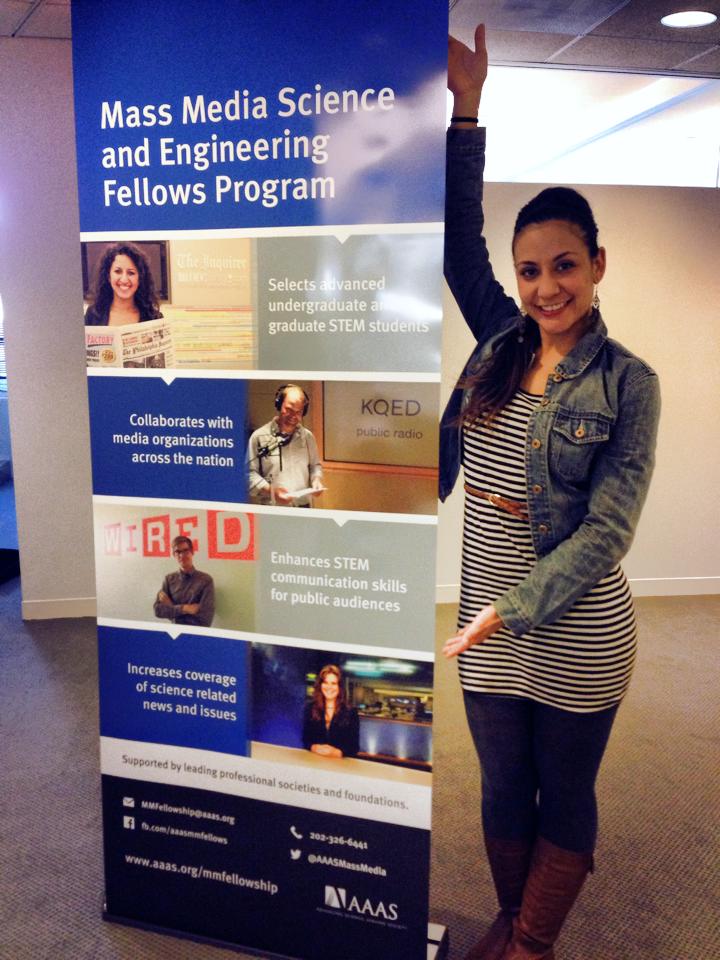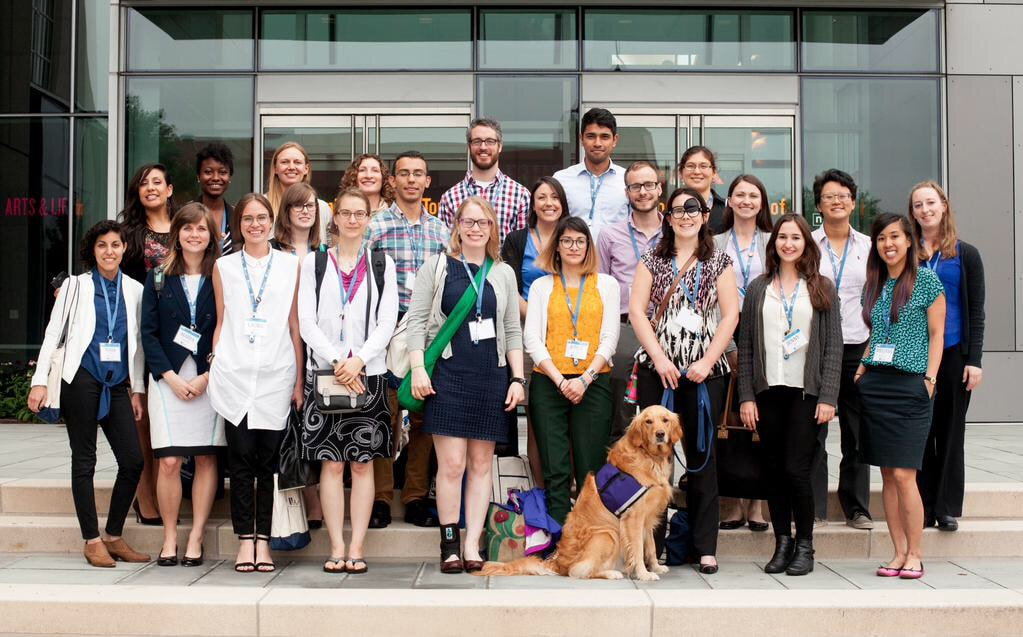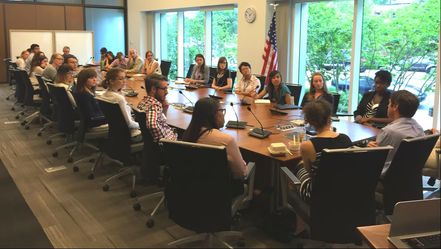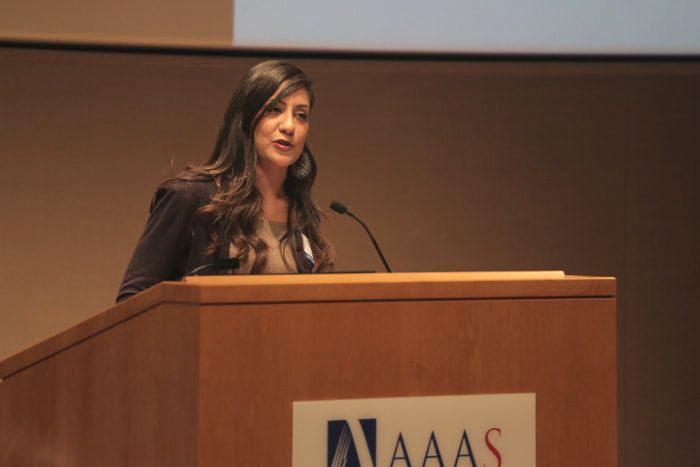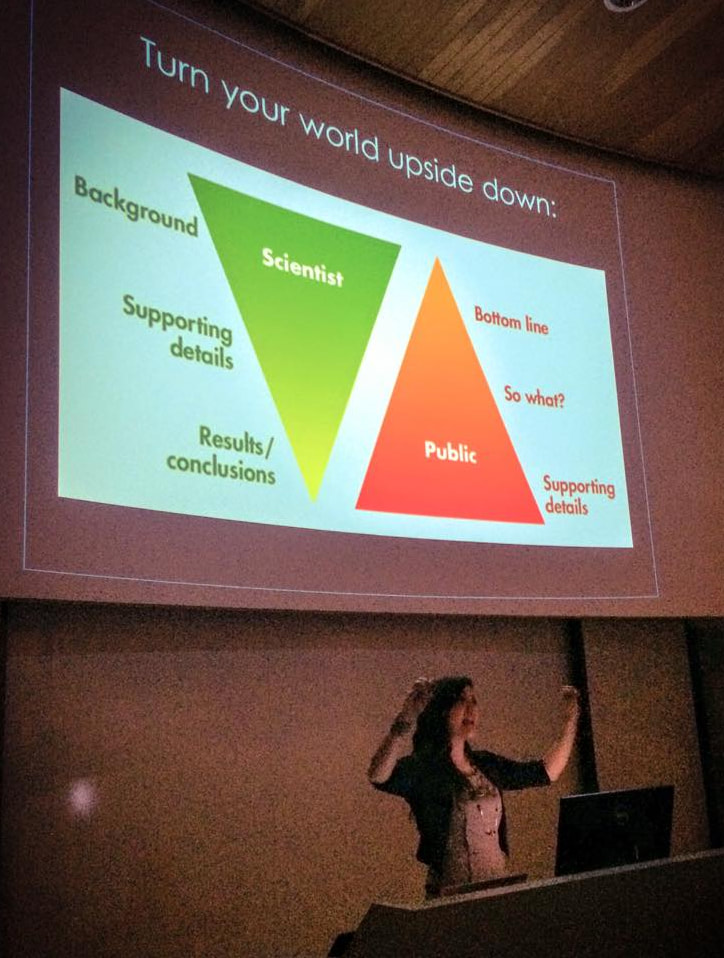Teaching scientists how to better communicate with each other and the public.
Scientists aren't typically known for their stellar ability to communicate, but that's only because they are trained to communicate like scientists. Don't get me wrong, formal science communication skills are necessary for writing killer journal articles, but they aren't as effective when interacting with folks outside of one's discipline. My goal is to build strong science communication skills that are, at times, counter to the decades of training scientists receive throughout their careers. The good news is that most scientists are eager to learn and adopt new approaches to engagement.
Read below to learn more about my work in science communication training.
Read below to learn more about my work in science communication training.
American Association for the Advancement of Science (AAAS)
Mass Media Science & Engineering Fellows Program
For 43 years, this highly competitive program has placed advanced student scientists, engineers, and mathematicians at media organizations nationwide. Fellows work as reporters at media outlets such as the Los Angeles Times, National Public Radio, and Scientific American using their academic training in the sciences as they report today's headlines, sharpening their abilities to communicate complex scientific issues to non-specialists. The fellowship program is designed to enhance coverage of science-related issues in the media in order to improve public understanding and appreciation of science and technology. Hear from the 2013 Fellows in the video below:
MY ROLE:
For 3 years, I was the Director of the AAAS Mass Media Science & Engineering Fellows Program, independently managing all aspects of the Fellowship, including fundraising, program development, marketing, and budgets. My responsibilities encompassed all activities associated with the implementation of the program, including recruitment, the selection process, selection committee oversight, trainings, Fellow placements, and reporting. My excitement for science communication and my complete dedication to the program was palpable, evidenced by large programmatic changes that reinvigorated its mission and resulted in rapid growth under my direction.
|
|
Before my arrival, the Fellowship had seen a steady decline in sponsorship for more than a decade; a decline in funding directly correlated with a decline in the annual number Fellows. After a few months under my direction, funding grew from supporting 11 Fellows to 15 Fellows. Within 2.5 years under my leadership, the program doubled to 22 Fellows, a result of an 80% increase in external funding to the program. In addition to the increase number of funding sources, I was also able to forge new media partnerships with Slate, WIRED, National Geographic, Discover Magazine, CNN, KQED, NOVA, and PBS News Hour.
During my time as Director, I introduced a suite of new marketing materials including: a new website, online application, online review process, videos (one shown above), postcard, pop-up banner (shown below), and the program’s first social marketing campaign.
In addition, I developed and administered, for the first time in the Fellowship's history, an alumni survey (55% response rate). The survey improved and expanded alumni database from 81 to 369 alum, thus preserving the Fellowship’s 40-year legacy and expanding networking opportunities for Fellows. Results were presented at the Fellowship's 40th Anniversary Celebration in Washington, DC and at the 2015 AAAS Annual Meeting in San Jose, CA.
Most notably, I created a new branch of the Fellowship that places Spanish speaking scientists in Spanish language news outlets to report scientific developments relevant to Spanish-speaking communities.
During my time as Director, I introduced a suite of new marketing materials including: a new website, online application, online review process, videos (one shown above), postcard, pop-up banner (shown below), and the program’s first social marketing campaign.
In addition, I developed and administered, for the first time in the Fellowship's history, an alumni survey (55% response rate). The survey improved and expanded alumni database from 81 to 369 alum, thus preserving the Fellowship’s 40-year legacy and expanding networking opportunities for Fellows. Results were presented at the Fellowship's 40th Anniversary Celebration in Washington, DC and at the 2015 AAAS Annual Meeting in San Jose, CA.
Most notably, I created a new branch of the Fellowship that places Spanish speaking scientists in Spanish language news outlets to report scientific developments relevant to Spanish-speaking communities.
University Seminars
Science communication goes far beyond academic papers. The benefits of science communication are vast and include an increase in science literacy and better-informed science policy. In addition, exceptional science communication includes effective means of disseminating scientific content through lectures, publications, grants, outreach initiatives, and interactions with the mass media. I host seminars where scientists and science students learn strategies and resources for adopting better science communication techniques for themselves and their students.
MY ROLE:
In 2013, I began providing career resources and science communication lectures at minority-serving conferences and during workshops for students visiting the AAAS campus. By 2014, I was being invited to speak at conferences and within academic departments at universities across the country and internationally. I have given seminars at:
- DiverseScholar Postdoctoral Conference (keynote)
- Florida International University
- Lawrence Berkeley National Labs
- American Meteorological Society (invited)
- Cambridge University
- University of Cincinnati
- Emory University
- National Society of Black Physicists Annual Conference (keynote)
- George Mason University (2x)
Science engagement specialist @dioneleetweets presents @JesusCollegeCam pic.twitter.com/U8Xz31bvcu
— Heather L. Ford (@hl_ford) January 11, 2018
Center for Research and Interdisciplinarity (CRI), France
Science Communication Workshop
In April of 2016, I was invited to give a two-day workshop to students in an interdisciplinary doctoral program at the Center for Research and Interdisciplinarity in Paris, France. The program promotes ambitious research projects involving interactions between a wide range of academic disciplines in the pursuit of understanding living systems, education, and discovery. In addition, the program combines research experience gained in the lab with interdisciplinary activities (e.g., like a science communication workshop) taught through the doctoral school.
This Friday @criparis w/ @dioneleetweets from @carnegiescience #SciComm > inscription here https://t.co/osQtxqbD7z pic.twitter.com/cPZFKuOl5T
— CRI Paris (@criparis) March 15, 2016
MY ROLE:Students enrolled in CRI are required to complete at least 300 hours of interdisciplinary training. With the goal of diversifying the curriculum, I was invited to create an interactive science communication workshop that fit the Center’s needs. I independently developed a 2-day workshop consisting of 8 lessons, 5 interactive activities, and a panel of subject matter experts from the local area. The lessons included titles such as "Defining Your Goals," "Identifying Your Audience," "Crafting Your Message," "Communication Using Social Media," "Infographics," and "Writing Well." The workshop started with a teaser seminar for the entire program entitled, "Science Communication as a Tool for Success." Based on comments provided by the students on feedback forms distributed at the end of the two days, the workshop was very well received. I am eager to use this curriculum as a model to develop future classes or workshops.
|
RELATED:Vertical Divider
|
|
Scientist, science enthusiast, science communicator, lover of all things fluffy and scaly.
